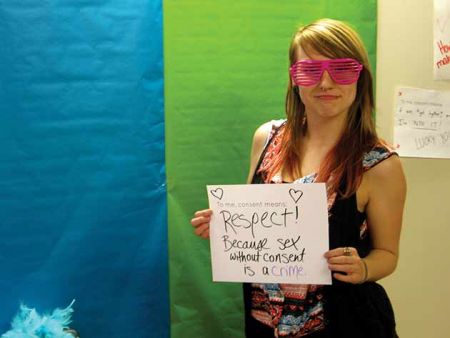No means no. It’s that simple. Or is it?
Not if the presentations at ConsentFEST were any indication.
The two-day conference, held Nov. 23 and 24, offered an in-depth look at consent. It explored what factors influence people’s abilities to provide — or not provide — consent.
And while discussions about consent often centre on sex, this conference offered a wider view of the issue.
“Consent is messy,” Shannon Hardy, a staffer for the homelessness support organization Adsum House, told the attendees of ConsentFEST’s first day at Saint Mary’s University.
Hardy says, because she is in a position of power, she can act with or without the consent of the women and children who visit her at the house, making important decisions about their lives.
To counteract that privilege, she’s trying to live a “consent-based life.” That means making room for consent in all her daily interactions.
Hardy has gone so far as to not rush her children out of the house to school. Instead, she accepts their pace.
Her pro-consent attitude has rubbed off on her children.
“I have a seven-year-old who asks consent before he chases kids around the schoolyard,” she said.
Her anecdote got the audience laughing, but it illustrates how often people brush past the notion of consent in their day-to-day encounters.
It’s not just about sex, said Rebecca Faria, the founder of Hollaback! Halifax, which is part of an international movement against street harassment.
It’s about not wanting to be petted during a conversation, having perfume spritzed at you in a department store or being offered a drink without asking for it.
“Consent is something that can’t be communicated by your presence or your clothing,” said Faria.
“It can only happen when everyone involved agrees to something.”
Faria defined consent as an act that is mutual, enthusiastic and active, not coerced, reluctant or passive.
These terms resurfaced repeatedly over the course of the conference.
They are what can make consent so “messy,” said Jackie Stevens.
Stevens deals with consent issues every day as a member of the Avalon Sexual Assault Centre, which provides counselling to sexual assault survivors and educational training on sexual assault.
She said, ideally, consent indicates a “willingness” and a “desire” to engage in an act and is not given because of “expectation” or “need.”
A person in a long-term relationship, for instance, may engage in sex because he or she feels it is expected.
For marginalized people, need often comes into play. Rene Ross knows this all too well.
The executive director of the sex worker support and advocacy organization Stepping Stone said there are many factors acting against prostitutes’ ability to provide consent.
Policing pushes sex workers to seek clients outside Halifax’s downtown core, in secluded areas that are more dangerous.
The social stigma of prostitution affects the quality of health care sex workers receive.
It is a cycle of inequality — often sex workers engage in the trade because they are desperate for money.
The list goes on.
These factors mean sex workers aren’t consenting to much of what goes on in their lives.
And as ConsentFEST showed, sex workers are far from the only group without much power to consent.
“We need to be able to make decisions and consent to things that are happening to us all the time,” said Ellen Taylor on the second day of the conference, held at Dalhousie University.
Taylor is in the process of researching the treatment of lesbian, gay, bisexual, transgendered and queer health care consumers.
She said the health care system gives medical professionals too much power and authority over patients.
“We need to trust people to make decisions about their own bodies, and then respect those decisions,” she said, whether it comes to taking a prescribed drug or abstaining from smoking.
Katie Aubrecht, a fellow panelist and Saint Mary’s University sociology professor, said consent is also major concern for people with disabilities.
For disabled people to consent to sex is not a question of willingness and desire of which Stevens spoke the previous day, said Aubrecht, but of whether they are seen as understanding what sex is, how to do it and being capable of doing it.
“Not everyone has the privilege of being recognized as a consenting or non-consenting individual,” she added.
While Hardy agrees, she said that, in order for something to actually be done about the inequality of consent, people need to recognize that it’s something anyone can lose the ability to give.
“If we look at it as a societal problem that can affect anyone, then we’re more likely to address it.”
This article was originally published in the Halifax Commoner.



